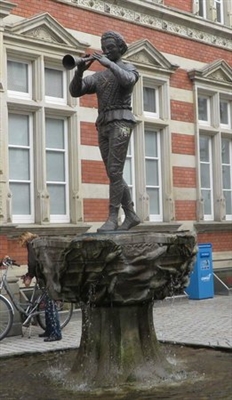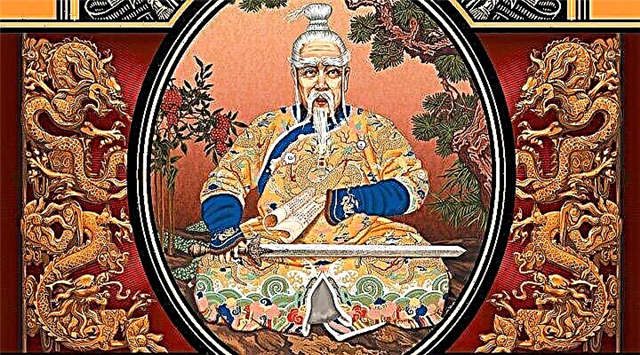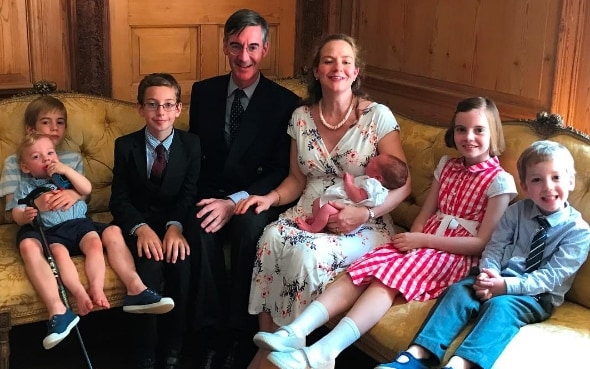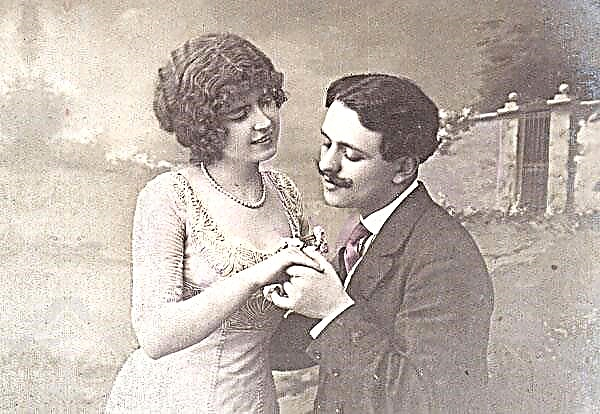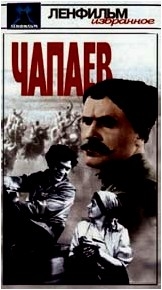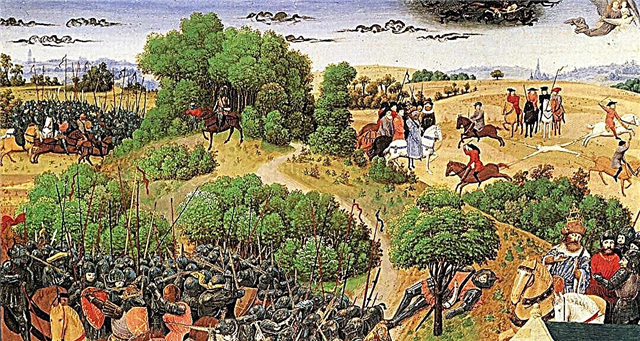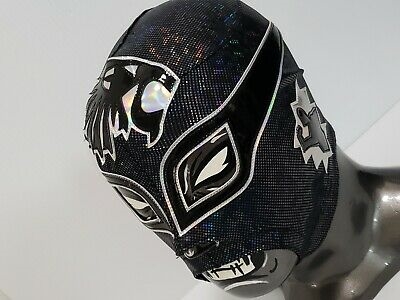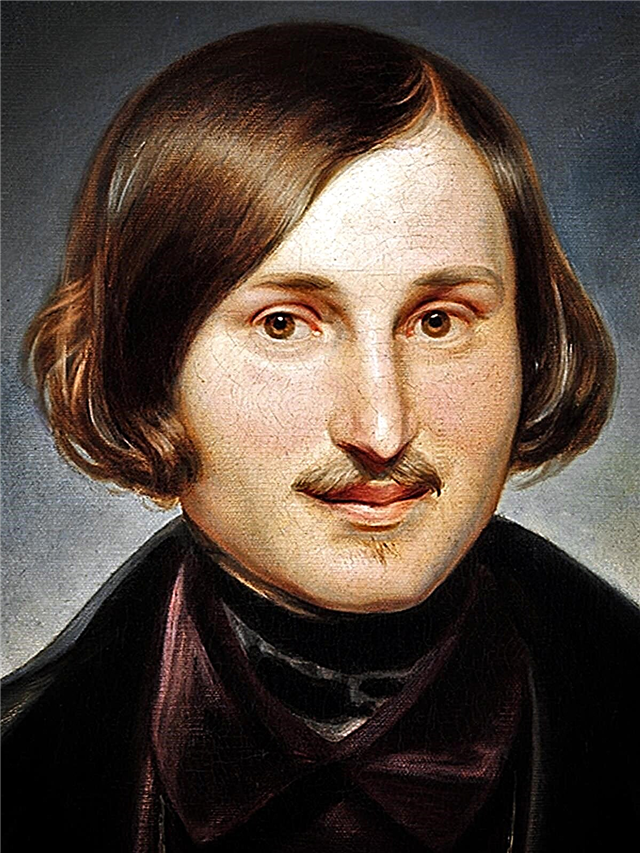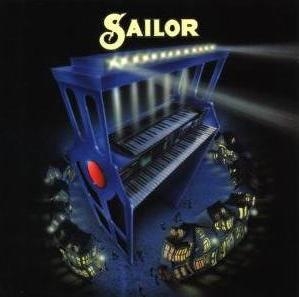In a certain village of Lamanch there lived one hidalgo whose property consisted of a family spear, an ancient shield, a skinny nag and a greyhound dog. His surname was either Kekhan, or Qesad, it is precisely unknown, and it does not matter. He was about fifty years old, his body was a lean man, his face was thin and day and night he read chivalric novels, which made his mind completely upset, and he decided to become a wandering knight. He cleaned the armor that belonged to his ancestors, attached a cardboard visor to the shishak, gave his old nag the sonorous name of Rocinante, and renamed himself Don Quixote Lamanchsky. Since the wandering knight must be in love, Hidalgo, on reflection, chose a lady of his heart: Aldonsa Lorenzo and named her Dulcinea of Tobos, because she was from Toboso. Having dressed in his armor, Don Quixote hit the road, imagining himself a hero of a chivalrous novel. After driving all day, he was tired and headed for the inn, taking him for a castle. The ugly appearance of the hidalgo and its lofty speeches made everyone laugh, but the good-natured master fed and watered him, although it was not easy: Don Quixote did not want to take off his helmet, which prevented him from eating and drinking. Don Quixote asked the owner of the castle, i.e. of the inn, to knight him, and before that he decided to spend the night in a vigil over weapons, putting him on a watering trough. The owner asked if Don Quixote had money, but Don Quixote did not read about the money in any novel and did not take it with him. The owner explained to him that although such simple and necessary things as money or clean shirts are not mentioned in the novels, this does not mean at all that the knights had neither one nor the other. At night, one driver wanted to water the mules and removed Don Quixote's armor from the watering trough, for which he received a spear strike, so the owner, who considered Don Quixote to be crazy, decided to knight him as soon as possible in order to get rid of such an uncomfortable guest. He assured him that the rite of passage consists of a slap in the back and a blow on the back with a sword, and after leaving, Don Quixote made a no less pompous, albeit not as long, speech as the newly-made knight.
Don Quixote turned home to stock up on money and shirts. Along the way, he saw a hefty villager bashing a shepherd boy. The knight stood up for the shepherd, and the villager promised him not to offend the boy and pay him everything that he should. Don Quixote, delighted with his good deed, rode on, and the villager, as soon as the defender of the offended disappeared from his eyes, was beaten to death by the shepherd. The oncoming merchants, whom Don Quixote forced to recognize Dulcinea Toboss as the most beautiful lady in the world, began to taunt him, and when he rushed at them with a spear, they smacked him, so that he arrived home beaten and exhausted. The priest and the barber, the fellow villagers of Don Quixote, with whom he often argued about chivalric novels, decided to burn malicious books from which he was damaged in his mind. They looked over the Don Quixote library and left almost nothing from it, except for Amadis Gallsky and a few more books. Don Quixote invited one farmer - Sancho Panza - to become his squire and talked so much to him and promised that he agreed. And then one night Don Quixote sat on Rocinante, Sancho, who dreamed of becoming governor of the island, mounted a donkey, and they secretly left the village. On the way, they saw windmills that Don Quixote mistook for giants. When he rushed to the mill with a spear, her wing turned and smashed the spear into pieces, and Don Quixote threw it to the ground.
In the inn, where they stopped for the night, the maid began to make her way in the dark to the driver, with whom she agreed on a date, but mistakenly stumbled upon Don Quixote, who decided that this was the daughter of the owner of the castle in love with him. There was a commotion, a fight broke out, and Don Quixote, and especially the innocent Sancho Panza, got a lot of fun. When Don Quixote, and after him Sancho refused to pay for the billets, several people who happened there dragged Sancho from the donkey and began tossing them on the covers like a dog during the carnival.
When Don Quixote and Sancho rode on, the knight took the herd of rams as an enemy army and began to crush the enemies left and right, and only the hail of stones that the shepherds brought down on him stopped him. Looking at Don Quixote's sad face, Sancho came up with his nickname: Knight of the Sad Image. One night, Don Quixote and Sancho heard an ominous knock, but when it dawned, it turned out to be cloth hammers. The knight was embarrassed, and his thirst for exploits remained this time unquenched. The barber who donned a copper basin on the head in the rain, Don Quixote mistook the knight in the helmet of Mambrin, and since Don Quixote took the oath to take possession of this helmet, he took the basin from the barber and was very proud of his feat. Then he released the convicts who were taken to the galleys, and demanded that they go to Dulcinea and give her greetings from her faithful knight, but the convicts did not want to, and when Don Quixote began to insist, they stoned him.
In Sierra Morena, one of the convicts, Gines de Pasamonte, stole a donkey from Sancho, and Don Quixote promised to give Sancho three of the five donkeys that he had on his estate. In the mountains, they found a suitcase containing some linen and a bunch of gold coins, as well as a book of poems. Don Quixote gave the money to Sancho, and took the book to himself. Cardeno turned out to be the owner of the suitcase - a half-mad young man who began to tell Don Quixote the story of his unhappy love, but didn’t tell him because they quarreled because Cardeno spoke in vain about Queen Madashima. Don Quixote wrote a love letter to Dulcinea and a note to his niece, where he asked her to give three donkeys to the “donor of the first donkey bill”, and went crazy for decency, that is, taking off his pants and several times overcrowding, sent Sancho to take the letters. Left alone, Don Quixote indulged in repentance. He began to think of something better to imitate: the violent insanity of Roland or the melancholy insanity of Amadis. Deciding that Amadis was closer to him, he began to compose poems dedicated to the beautiful Dulcinea. On the way home, Sancho Panza met a priest and a barber — his fellow villagers, and they asked him to show them Don Quixote’s letter to Dulsinea, but it turned out that the knight had forgotten to give him letters, and Sancho began to quote the letter by heart, twisting the text so that instead of “passionless senora ”he turned out to be a“ fail-safe senora ”, etc. The priest and the barber began to invent a means to lure Don Quixote from Poor Stremnina, where he indulged in repentance, and delivered to his native village to cure him of insanity there. They asked Sancho to tell Don Quixote that Dulsinea had told him to come to her immediately. They assured Sancho that all this venture would help Don Quixote become, if not the emperor, then at least the king, and Sancho willingly agreed to help them in anticipation of favors. Sancho went to see Don Quixote, and the priest and the barber stayed to wait for him in the forest, but suddenly they heard poetry - it was Cardeno who told them his sad story from beginning to end: the treacherous friend Fernando kidnapped his beloved Lucinda and married her. When Cardeno finished the story, a sad voice was heard and a beautiful girl appeared, dressed in a man’s dress. It turned out to be Dorothea, seduced by Fernando, who promised to marry her, but left her for Lucinda. Dorothea said that Lucinda, after her betrothal to Fernando, was going to commit suicide, for she considered herself the wife of Cardeno and agreed to marry Fernando only at the insistence of her parents. Dorothea, having learned that he had not married Lucinda, hoped to return him, but could not find him anywhere. Cardeno revealed to Dorothea that he was the true husband of Lucinda, and together they decided to seek the return of "what belongs to them by right." Cardeno promised Dorothea that if Fernando did not return to her, he would challenge him to a duel.
Sancho told Don Quixote that Dulcinea was summoning him to him, but he replied that he would not appear before her until he accomplished the feats of "her mercy worthy." Dorothea volunteered to help lure Don Quixote from the forest and, calling herself the Princess of Mikomikonskaya, said that she had arrived from a distant country, to which the rumor of the glorious knight Don Quixote had reached to ask for his intercession. Don Quixote could not refuse the lady and went to Mycomicon. They met a traveler on a donkey - it was Gines de Pasamonte, a convict who was freed by Don Quixote and who stole a donkey from Sancho. Sancho took the donkey for himself, and everyone congratulated him on this luck. At the source they saw a boy - that same shepherdess, whom Don Quixote had recently stood up for. The shepherd said that the intercession of the hidalgo came to him sideways, and cursed what the light was worth of all the wandering knights, which brought Don Quixote into a rage and embarrassment.
Having reached the very inn where Sancho was tossed up on a blanket, the travelers stopped for the night. At night, the frightened Sancho Panza ran out of the closet where Don Quixote was resting: Don Quixote in a dream fought with enemies and waved his sword in all directions. Wineskins with wine hung over his head, and mistaking them for giants, he blew them over and poured them all with wine, which Sancho mistook for blood. Another company drove up to the inn: a masked lady and several men. A curious priest tried to ask the servant who these people were, but the servant himself did not know, he only said that the lady, judging by the clothes, was a nun or was going to the monastery, but apparently not of her own free will, and she sighed and cried all the way. It turned out that it was Lucinda, who decided to retire to the monastery, since she could not connect with her husband Cardeno, but Fernando stole her from there. Seeing Don Fernando, Dorothea rushed to his feet and began to beg him to return to her. He heeded her pleas, Lucinda was happy, having reunited with Cardeno, and only Sancho was upset, for he considered Dorothea the Princess of Mikomikonskaya and hoped that she would shower his master with favors and that he would also fall for something. Don Quixote believed that everything was settled thanks to the fact that he defeated the giant, and when he was told about the perforated wineskin, he called it the spell of the evil wizard. The priest and the barber told everyone about the insanity of Don Quixote, and Dorothea and Fernando decided not to leave him, but to deliver him to the village, to which there were no more than two days of journey. Dorothea told Don Quixote that she owed her happiness to her, and continued to play the role she had begun. A man and a Moorish woman drove up to the inn. The man turned out to be a captain from the infantry who was captured during the battle of Lepanto. The beautiful Mauritanian woman helped him escape and wanted to be baptized and become his wife. Following them came a judge with her daughter, who turned out to be the captain’s brother and was unspeakably glad that the captain, from whom there had been no news for a long time, was alive. The judge was not embarrassed by his deplorable appearance, for the captain was robbed on the way by the French. At night, Dorothea heard the song of the mule driver and woke the judge’s daughter Clara to listen to her, but it turned out that the singer was not a mule driver at all, but a disguised son of noble and wealthy parents named Louis, in love with Clara. She is not of very noble origin, so the lovers were afraid that his father would not give consent to their marriage. A new group of horsemen drove up to the inn: it was Luis’s father who set out to chase his son. Louis, whom the servants of his father wanted to take home, refused to go with them and asked for Clara's hands.
Another barber arrived at the inn, the one who donated Quixote's "Mambrin helmet" and began to demand the return of his basin. A skirmish began, and the priest slowly gave him eight reais for his basin to stop it. Meanwhile, one of the guards who happened at the inn recognized Don Quixote by signs, for he was wanted as a criminal for releasing convicts, and the priest had great difficulty convincing the guards not to arrest Don Quixote, because he was out of his mind. The priest and the barber made from the sticks something like a convenient cage and conspired with one man who was riding past on the oxen that he would take Don Quixote to his native village. But then they let Don Quixote out of the cage on parole, and he tried to take away the statue of the immaculate virgin from the worshipers, considering her a noble seigneur who needed protection. Finally, Don Quixote arrived home, where the housekeeper and niece put him to bed and began to look after him, and Sancho went to his wife, who promised that next time he would certainly return to the count or governor of the island, and not some seedy one, but the best best wishes.
After Don Quixote nursed the housekeeper and niece for a month, the priest and the barber decided to visit him. His speeches were reasonable, and they thought that his insanity had passed, but as soon as the conversation remotely touched the chivalry, it became clear that Don Quixote was terminally ill. Sancho also visited Don Quixote and told him that the son of their neighbor returned to Salamanca, bachelor Samson Carrasco, who said that the story of Don Quixote, written by Sid Ahmet Beninhali, was published, which describes all the adventures of him and Sancho Panza. Don Quixote invited Samson Carrasco to his place and asked him about the book. The bachelor listed all her strengths and weaknesses and said that she reads everything from young to old, especially as her servants love her. Don Quixote and Sancho Panza decided to take a new trip and a few days later secretly left the village. Samson accompanied them and asked Don Quixote to report all his successes and failures. Don Quixote, on the advice of Samson, went to Zaragoza, where the jousting tournament was supposed to take place, but first decided to call in Toboso to receive the blessing of Dulcinea. Arriving in Toboso, Don Quixote began asking Sancho where Dulcinea's palace was, but Sancho could not find it in the dark. He thought that Don Quixote knew this himself, but Don Quixote explained to him that he had never seen not only the palace of Dulcinea, but also her own, for he had rumored in love with her. Sancho replied that he had seen her and brought back an answer to Don Quixote's letter, also rumored. To prevent the fraud from surfacing, Sancho tried to take his master out of Toboso as soon as possible and persuaded him to wait in the forest until he, Sancho, went to the city to talk with Dulsinea. He realized that since Don Quixote had never seen Dulcinea, then any woman could be passed off for her, and when he saw three peasant women on donkeys, he told Don Quixote that Dulcinea was coming to him with the court ladies. Don Quixote and Sancho fell in front of one of the peasant women, while the peasant woman shouted rudely at them. Don Quixote saw in this whole story the wizardry of an evil wizard and was very saddened that instead of the beautiful seniors he saw a plain woman peasant.
In the forest, Don Quixote and Sancho met the Vandal Knight of Mirrors in love with Casilda, who boasted that he had defeated Don Quixote himself. Don Quixote was indignant and challenged the Knight of Mirrors to a duel, according to which the conquered should surrender to the mercy of the winner. The Knight of Mirrors did not have time to prepare for battle, as Don Quixote had already attacked him and nearly finished him off, but the squire of the Knight Mirrors shrieked that his master was none other than Samson Carrasco, who hoped to return Don Quixote in such an ingenious way. But alas, Samson was defeated, and Don Quixote, confident that the evil wizards replaced the appearance of the Knight of Mirrors with the appearance of Samson Carrasco, again moved along the road to Zaragoza. On the way he was caught up by Diego de Miranda, and the two hidalgo rode together.A wagon drove towards them, in which they brought lions. Don Quixote demanded that the cage with the huge lion be opened, and was about to chop it into pieces. The frightened watchman opened the cage, but the lion did not come out of it, the fearless Don Quixote from now on began to call himself the Knight of the Lions. Having stayed with don Diego, Don Quixote continued his journey and arrived in the village, where the wedding of Kiteriya the Beautiful and Camacho the Rich was celebrated. Before the wedding, Basillo Poor, a neighbor of Kiteriya, who had fallen in love with her since childhood, approached Kiteriya and pierced his chest with a sword in front of everyone. He agreed to confess before death only if the priest marries him with Kiteria and he dies her husband. Everyone persuaded Kiteriya to take pity on the sufferer - because he was about to give up his spirit, and Kiteriya, widowed, would be able to marry Camacho. Kiteria gave Basillo a hand, but as soon as they were married, Basillo jumped to his feet, alive and well — he adjusted all this to marry his beloved, and she seemed to be conspiring with him. Camacho, judiciously, considered it best not to be offended: why would he need a wife who loves another? After spending three days with the bride and groom, Don Quixote and Sancho moved on.
Don Quixote decided to go down to the cave of Montesinos. Sancho and the student conductor tied him with a rope, and he began to descend. When all one hundred rope strands were unwound, they waited for half an hour and began to pull the rope, which turned out to be so easy as if there was no load on it, and it was hard to pull only the last twenty braces. When they removed Don Quixote, his eyes were closed and they hardly managed to push it. Don Quixote said that he saw many miracles in the cave, he saw the heroes of the old romances Montesinos and Durandart, as well as the enchanted Dulsinea, who even asked him for six reals. This time, his story seemed implausible even to Sancho, who knew well what kind of wizard he had enchanted Dulsinea, but Don Quixote firmly stood his ground. When they got to the inn, which Don Quixote, as usual, did not consider the castle, there appeared Maesa Pedro with a monkey diviner and district committee. The monkey recognized Don Quixote and Sancho Pansa and told everything about them, and when the performance began, Don Quixote, sparing noble heroes, threw himself a sword at their pursuers and killed all the dolls. True, then he generously paid Pedro for the destroyed rack, so that he was not offended. In fact, it was Gines de Pasamonte, who was hiding from the authorities and was engaged in the craft of a rashnik - therefore, he knew everything about Don Quixote and Sancho, usually before entering the village, he asked in the vicinity about his inhabitants and “guessed” for a small bribe past.
Once, having left on a sunset on a green meadow, Don Quixote saw a crowd of people - it was a falconry of the duke and duchess. The Duchess read a book about Don Quixote and was filled with respect for him. She and the duke invited him to her castle and received him as an honored guest. They and their servants played a lot of jokes with Don Quixote and Sancho and did not cease to marvel at Don Quixote's judiciousness and madness, as well as Sancho's ingenuity and innocence, who ultimately believed that Dulcinea was bewitched, even though he himself acted as a sorcerer and all this rigged up. On a chariot, the wizard Merlin arrived at Don Quixote and announced that in order to conjure Dulsinea, Sancho must voluntarily warm himself with a whip on his bare buttocks three thousand three hundred times. Sancho opposed, but the duke promised him an island, and Sancho agreed, all the more so because the scourging period was not limited and it was possible to do this gradually. Countess Trifaldi arrived at the castle, she is Gorevana, a duet of the Princess of Metonymy. The wizard Zlosmrad turned the princess and her husband Trenbreno into statues, and beards began to grow at the duet Gorevana and twelve other duels. Only the valiant knight Don Quixote could dispel them all. Zlosmrad promised to send a horse for Don Quixote, who would quickly take him and Sancho to the kingdom of Kandaya, where the valiant knight would fight Zlosmrad. Don Quixote, determined to rid the duans of his beards, together with Sancho sat blindfolded on a wooden horse and thought that they were flying through the air, while the duke's servants blew them with air from furs. “Arriving” back to the duke’s garden, they found the message of Zlosmrad, where he wrote that Don Quixote had bewitched everyone by the fact that he ventured on this adventure. Sancho was impatient to look at the faces of duos without beards, but the entire duo squad had already disappeared. Sancho began to prepare to manage the promised island, and Don Quixote gave him so many reasonable instructions that he struck the duke and duchess - in everything that did not concern chivalry, he "showed a clear and vast mind."
The duke sent Sancho with his large retinue to the town, which was to pass for the island, because Sancho did not know that the islands are only in the sea, and not on land. There he was solemnly handed the keys to the city and declared the life governor of the island of Barataria. To begin with, he had to resolve the lawsuit between the peasant and the tailor. The peasant brought the cloth to the tailor and asked if the cap would come out of it. Hearing that it would come out, he asked if two caps would come out, and when he found out that two would come out, he wanted to get three, then four and stopped at five. When he came to receive the caps, they were on his finger. He became angry and refused to pay the tailor for work, and in addition began to demand back cloth or money for him. Sancho thought and sentenced: the tailor should not be paid for the work, the peasant should not be returned the cloth, and the caps should be donated to the prisoners. Then two old men came to Sancho, one of whom, long ago, borrowed ten gold from another and claimed that he had returned it, while the lender said that he did not receive this money. Sancho made the debtor swear that he had repaid the debt, and he, having let the lender hold his staff for a moment, swore. Seeing this, Sancho guessed that the money was hidden in a staff, and returned it to the lender. Following them came a woman, dragging a man by the hand, who allegedly raped her. Sancho told the man to give his purse to the woman and let the woman go home. When she got out, Sancho told the man to catch up with her and take her purse, but the woman resisted so much that he failed. Sancho immediately realized that a woman had slandered a man: if she showed at least half the fearlessness with which she defended her wallet, when she defended her honor, the man could not overcome her. Therefore, Sancho returned the wallet to the man, and drove the woman from the island. Everyone marveled at Sancho's wisdom and the justice of his sentences. When Sancho sat at a table laden with food, he was unable to eat anything: as soon as he reached out to some dish, Dr. Pedro Unbearably de Nauka ordered him to be removed, saying that it was unhealthy. Sancho wrote a letter to his wife Teresa, to whom the duchess added a letter from herself and a string of corals, and the duke's page delivered letters and gifts to Teresa, stirring the whole village. Teresa was delighted and wrote very reasonable answers, and also sent the Duchess half a meter of selected acorns and cheese.
The enemy attacked Barataria, and Sancho was supposed to defend the island with weapons in his hands. Two shields were brought to him and one was tied in front and the other behind so tight that he could not move. As soon as he tried to budge, he fell and remained lying, sandwiched between two shields. They ran around him, he heard screams, the ringing of weapons, furiously chopped down his shield with his sword, and finally there were screams: “Victory! The enemy is broken! ” Everyone began to congratulate Sancho on his victory, but as soon as he was lifted, he saddled the donkey and went to Don Quixote, saying that ten days of governorship were enough for him, that he was not born neither for battle, nor for wealth, and did not want to obey either a cheeky doctor, no one else. Don Quixote began to be burdened by the idle life that he led with the duke, and together with Sancho left the castle. In the inn, where they stayed for the night, they met don Juan and don Jeronimo, who read the anonymous second part of Don Quixote, which Don Quixote and Sancho Panza considered to be a slander. It said that Don Quixote fell out of love with Dulcinea, while he still loved her, the name of Sancho's wife was mixed up and was full of other inconsistencies. Upon learning that this book describes a tournament in Zaragoza with the participation of Don Quixote, replete with all sorts of nonsense. Don Quixote decided not to go to Zaragoza, but to Barcelona, so that everyone could see that Don Quixote, depicted in the anonymous second part, was not at all the one described by Sid Ahmet Beninhali.
In Barcelona, Don Quixote fought with the Knight of the White Moon and was defeated. The White Moon Knight, who was none other than Samson Carrasco, demanded that Don Quixote return to his village and not leave the whole year, hoping that in that time his mind would return. On the way home, Don Quixote and Sancho had to visit the ducal castle again, for its owners were just as crazy about jokes and practical jokes as Don Quixote was about chivalric novels. In the castle there was a hearse with the body of the maid Altisidora, who supposedly died from unrequited love for Don Quixote. To resurrect her, Sancho had to endure twenty-four clicks on his nose, twelve tweaks and six pinpricks. Sancho was very unhappy; for some reason, in order to conjure Dulcinea, and in order to revive Altisidor, it was he who had to suffer, who had nothing to do with them. But everyone persuaded him so much that he eventually agreed and suffered torture. Seeing how Altisidore came to life, Don Quixote began to rush Sancho with self-flagellation in order to conjure Dulcinea. When he promised Sancho to pay generously for each blow, he willingly began to whip himself, but quickly realizing that it was night and they were in the forest, he began to lash trees. At the same time, he moaned so pitifully that Don Quixote allowed him to interrupt and continue to scourge the next night. At the inn, they met Alvaro Tarfe, taken out in the second part of the fake Don Quixote. Alvaro Tarfe admitted that he had never seen either Don Quixote or Sancho Panza who stood in front of him, but he saw another Don Quixote and another Sancho Panza, who were completely different from them. Returning to his native village, Don Quixote decided to become a shepherd for a year and invited the priest, bachelor and Sancho Panza to follow his example. They approved his venture and agreed to join him. Don Quixote had already begun to remake their names in a pastoral fashion, but soon became ill. Before his death, his mind cleared up, and he called himself not Don Quixote, but Alonso Chihano. He cursed the chivalrous novels that clouded his mind, and died calmly and in a Christian way, like no wandering knight was dying.

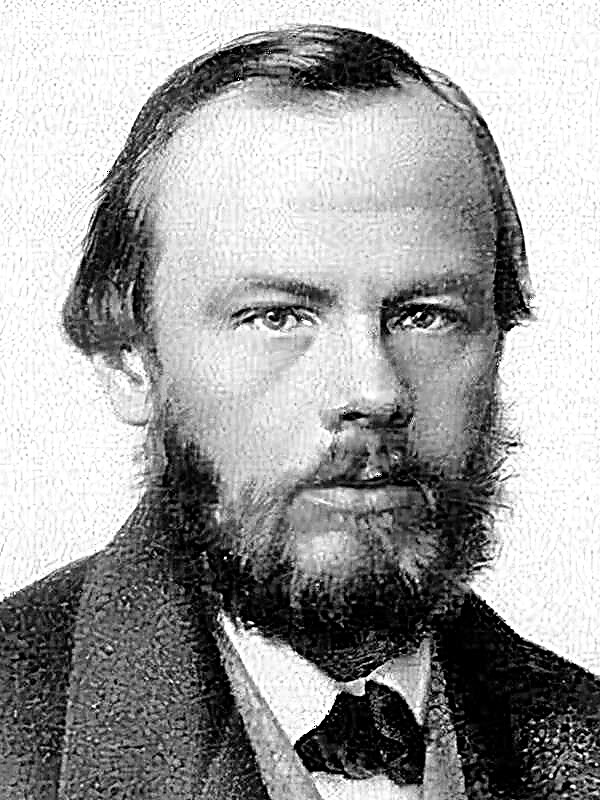
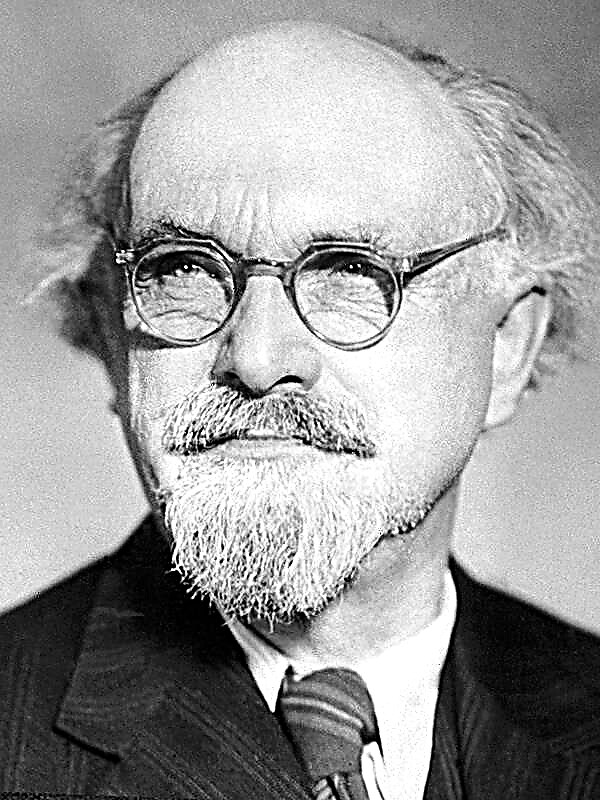
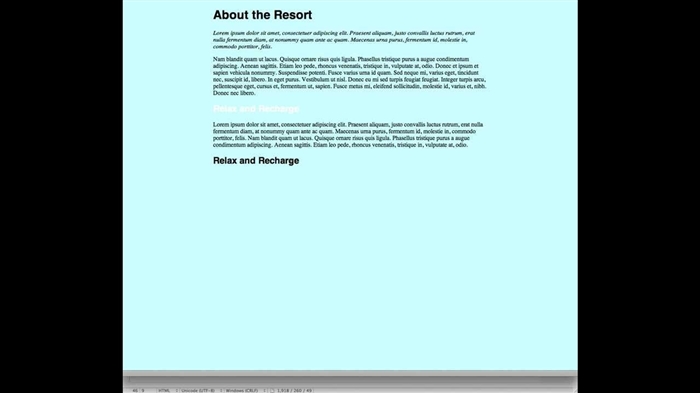 Two Ivan
Two Ivan